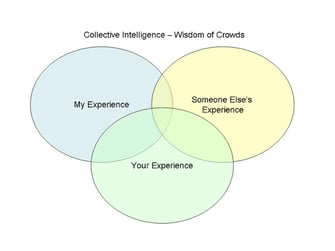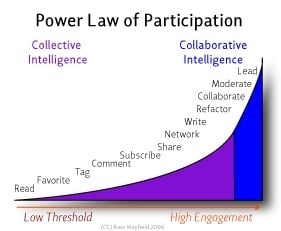 The most productive and valuable piece of the weekly meeting is Collective Intelligence. Collective Intelligence is a benchmark in every weekly meeting to solve bottlenecks using the collective genius of the team. CI is perhaps the greatest value of the weekly meeting rhythm.
The most productive and valuable piece of the weekly meeting is Collective Intelligence. Collective Intelligence is a benchmark in every weekly meeting to solve bottlenecks using the collective genius of the team. CI is perhaps the greatest value of the weekly meeting rhythm.
As a Gazelles coach I often facilitate the executive team meetings with my customers. We discussed in Leadership Dominance how when the CEO is the facilitator contribution from your team is reduced by 40%. Furthermore he’s found that if you have the facilitator pen in your hand it reduces group effectiveness & people IQ by another 20%. A number of my customers have learned that by not leading the meeting they are able to contribute more, listen better, learn and engage at a much different level than if they were struggling with keeping the meeting on track.
Discipline Required
If you conduct weekly meetings it’s probably happened to you that a discussion often invades one of the other segments of the meeting(Good News, Numbers, Customer & Employee Feedback, Accountabilities) which is probably more appropriately designated to Collective Intelligence. When you get sidetracked and attempt to do CI in the moment a couple things, mostly detrimental, can occur. You would do well to remember these before allowing the conversation to stray too much into this Collective Intelligence segment:
- Engagement: When you engage in a discussion best regulated to Collective Intelligence at a time not specifically designated for CI, you lose engagement from the other members.
 Most often the discussion begins with one person having a question about Good News, the numbers or more likely customer and employee feedback that they are specifically interested in. It’s easy if this is a quick answer, but more often the question cannot be answered easily. The other members aren’t dialed into the issue or don’t have the same interest in that moment, so they dial out or fail to participate. By discussing the issue in detail in the moment you may inhibit contributions for other team members which is what makes Collective Intelligence so valuable – getting input from everyone on sticky issues. Depending on the size of your meeting you reduce valuable collective intelligence insights by 50% or more by eliminating leadership team members who are not fully engaged.
Most often the discussion begins with one person having a question about Good News, the numbers or more likely customer and employee feedback that they are specifically interested in. It’s easy if this is a quick answer, but more often the question cannot be answered easily. The other members aren’t dialed into the issue or don’t have the same interest in that moment, so they dial out or fail to participate. By discussing the issue in detail in the moment you may inhibit contributions for other team members which is what makes Collective Intelligence so valuable – getting input from everyone on sticky issues. Depending on the size of your meeting you reduce valuable collective intelligence insights by 50% or more by eliminating leadership team members who are not fully engaged. - Worm Holes: Many times getting sidetracked leads to hole that has no end and gets the meeting and the specific segment so off track it’s difficult to pull back and regain focus. Recognize when the discussion is getting on to a side road, pull it back or simply say, “This is an interesting subject, let’s take it up at another time.” Another alternative is to schedule a time to meet with the appropriate people to work through it and save the rest of the team from being subjected to the digression.
- Concentration: Scientific research suggests the average person loses focus 6-10 times every minute. Sidetracking to deal with an immediate issue loses the focus of everyone but those involved in the discussion. It wastes time.
- Discipline: Staying disciplined is important in whatever we do from exercise to a major project we’re undertaking. Discipline is vastly underrated. The practice of discipline leads to greater discipline. It may not appear that staying on track is critical, yet simply following a structure, sticking to it, and remaining disciplined to following lt sends a message not to deviate. It regiments everyone to stay on course. This extends to how your team conducts themselves beyond the meeting.
- Time Management: Interruptions like this steal time for other segments. An important discussion may not be discussed at all, and thus a bottleneck or issue goes another week without a solution. Set a time limit on how much you will dedicate to Collective Intelligence. If you agree it is the most valuable time frame in the meeting making sure 30-45 minutes of your meeting is dedicated to solving issues is a great use of time. If you don’t have many issues then you can adjourn early, and who doesn’t like that?
What did I miss? Is there another reason that should be listed here? Let me know by writing a comment if you have an idea.
Who leads your meetings? This person needs to be aware how getting sidetracked and failing to stick to the agenda means less time for Collective Intelligence. Your business may not have issues, bottlenecks or ideas that need to be hashed out and solved. That might be a sign of something as well. People who don’t get stuck usually aren’t for a reason. They’re not doing much at all. My guess is your business has a number of issues that need solving on a weekly basis. At the very least there are a lot of good ideas that should be explored and discovered. This is why Collective Intelligence should be the weekly agenda item everyone looks forward to.
Which is more valuable good ideas, or good people? This is one of the questions answered by Ed Catmull author of Creativity, Inc.: Overcoming the Unseen Forces That Stand in the Way of True Inspiration, co-founder (with Steve Jobs and John Lasseter) of Pixar Animation Studios, the Academy Award–winning studio behind Inside Out and Toy Story. Which is the answer you’d choose? We’ll explore the answer next blog






.jpeg?width=150&height=135&name=Hand%20with%20marker%20writing%20the%20question%20Whats%20Next_%20(1).jpeg)

